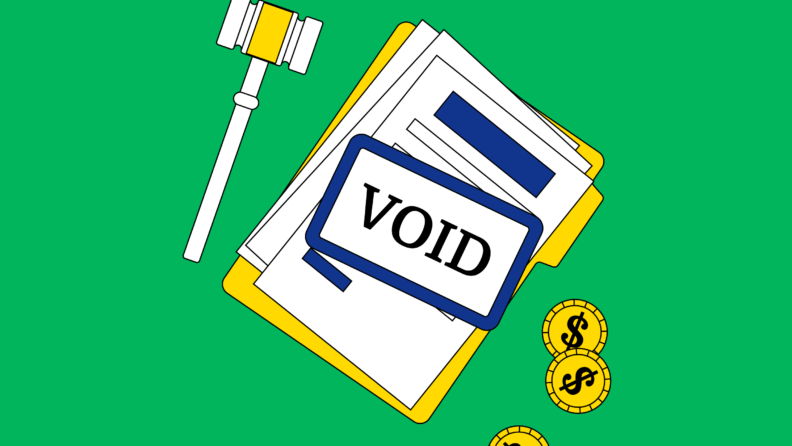When you put your signature on a contract, the paperwork transforms into a legally binding commitment, as long as the contract itself is legit.
But here's the curveball: sometimes, even after you've signed it, a contract can be invalidated, rendered null and void. It's as if it never existed in the first place, making it unenforceable from the get-go.
In this guide, we'll get into the nitty-gritty of what makes a legally valid contract and what factors can strip it of its legal standing, plus we'll touch on something known as a "voidable contract," which has its own unique characteristics. Let's get into it.
What Is A Void Contract?
A void contract is a formal agreement that's invalid and unenforceable right from the start. It's different from a voidable contract, which, despite its flaws, could potentially become legally enforceable if its underlying issues are rectified. A void contract never had any legal validity to begin with and will remain unenforceable in the future, regardless of efforts. We'll cover these terms in more detail later.
Understanding Void Contracts
A contract can be rendered void when the original agreement becomes unenforceable as initially written. Void contracts, sometimes called "void agreements," typically involve agreements that are either illegal or violate principles of fairness or public policy.
These contracts often arise when one of the parties involved is incapable of fully comprehending the agreement's implications. For instance, if someone is mentally impaired or under the influence of alcohol or drugs, they might not be in a position to understand the terms of the contract, making it void.
Additionally, contracts entered into by minors are often considered void, although some exceptions exist if a parent or guardian consents to the contract.
Another scenario leading to a void contract is when it involves illegal actions. If a contract is for activities that are against the law, such as an agreement between an illegal drug supplier and a drug dealer, it's unenforceable from the start due to the agreement's illegal or prohibited nature.
Further, a contract can become void if there's a change in laws or regulations after the agreement is made but before the contract is fulfilled. If the activities described in the contract, which were once legal, become illegal due to a change in the law, the contract is voided.
What Makes A Contract Null And Void
Navigating the intricacies of contract law requires a keen understanding of the factors that can render an agreement null and void. Here are the most common reasons:
1. Uncertainty or Ambiguity
When a contract fails to clearly outline the actions expected from both parties, leading to confusion and uncertainty, it can render the contract null and void. For example, think of a contract about investing in a property. If it doesn't say where the property is located, the contract is void.
Plus, you won't face any legal consequences if you don't follow the contract rules, because the contract isn't valid.
2. Lack of Legal Capacity
For a contract to carry legal weight, all signing parties must possess legal capacity, meaning they are capable of comprehending and agreeing to the contract's terms. If legal capacity is lacking, the contract is void.
Lack of legal capacity unfolds in various scenarios:
- Minors and Contracts: Contracts entered into by minors or underage individuals below the age of majority (typically 18 years old), are usually considered voidable. Minors can choose to enforce or disaffirm the contract upon reaching adulthood.
- Mentally Incapacitated Individuals: Contracts signed by individuals with mental incapacity, such as severe mental illness or cognitive impairment, may be deemed void. Such individuals might lack the understanding or judgment required for a legally binding agreement.
- Intoxicated Individuals: Contracts made by heavily intoxicated or drug-influenced individuals may be void, too. Intoxication can compromise judgment, preventing full comprehension and consent.
3. Incomplete Terms
If a contract overlooks one or more essential terms, it falls into the category of a void contract. For instance, failing to specify the contract's commencement date or its deadline can result in invalidation.
4. Misrepresentation or Fraud
When a party manipulates or conceals facts to induce the other party into a contract, it's known as misrepresentation or fraud.
Misrepresentation can be unintentional or intentional, while fraud is intentionally deceiving someone. In both cases, the contract is null, and the harmed party can cancel the contract and seek compensation. For instance, selling a fake Picasso painting under the guise of it being an original is an instance of misrepresentation or fraud.
5. Common Mistake
Contracts can crumble due to mutual misunderstandings. For example, if both parties mistakenly believe a car to be in existence when, in reality, it was destroyed, a common mistake arises, rendering the contract void.
6. Duress or Undue Influence
Contracts become null and void if one party is coerced into signing through threats or manipulation. Duress involves physical or mental threats, while undue influence occurs when someone manipulates or pressures another party into an agreement against their will. Examples include a desperate individual forced into an unreasonably high-interest loan due to influence, or a son forcing his ill father to alter his will under threat.
7. Public Policy or Illegal Activity
An illegal or prohibited contract involves terms that breach the law or engage in activities against public welfare or conflict with public policy. For example, contracts involving slavery contradict societal norms and are immediately void. Similarly, a contract employing minors in hazardous jobs contradicts The Fair Labor Standards Act (FLSA) and would be void.
Void Contracts vs. Voidable Contracts
Understanding the difference between "void" and "voidable" contracts sheds light on their legal standing.
Void Contracts: These are contracts that were never valid from the get-go due to how they were written. Imagine someone trying to sell you a magic carpet in the real world – it's impossible, so the contract would be void. Such contracts might have terms that are illegal, involve parties who weren't in the right state of mind or weren't old enough to understand, or infringe upon someone's rights.
Contracts that were valid when signed but became impossible to carry out due to new laws can also be void. For instance, if you made an agreement to sell something that was later banned by new regulations, the contract becomes void.
Voidable Contracts: These contracts start off valid and can be enforced if both parties agree. However, there's a twist: while one party is bound by the contract, the other can back out legally. This often happens when something sketchy went on during the agreement.
Suppose you agree to buy a vintage car, unaware it was previously involved in a major accident. If the seller deliberately conceals this crucial information, the contract could be voidable. The agreement itself could have been executed, but the seller's deceptive actions cast uncertainty.
Here are a few situations where a contract could be voidable:
- If someone was forced or threatened into signing.
- If someone signed while under the influence.
- If someone wasn't mentally capable of understanding what they were signing.
- If the terms of the contract were broken.
- If both parties made mistakes.
- If the contract involves something illegal.
In essence, a "void" contract is like a non-starter due to its flaws, while a "voidable" contract can be legit if both parties are on board, yet one has the option to bail out legally if the situation calls for it.
How To Avoid Null And Void Contracts
To steer clear of the pitfalls associated with null and void contracts, you should take proactive measures and practice careful consideration during the contract formation process. Here are a few tips to help you avoid entering into such risky agreements:
1. Verify Mental Capacity
Verify the legal capacity of all parties involved before signing a contract. Confirm the legal age, mental competency, and legal authority of individuals or entities participating to ensure they are capable of entering into a binding contract.
2. Conduct Thorough Due Diligence
Before signing any contract, do thorough due diligence. Research the parties involved, their track record, and credibility. Dive into background checks, document scrutiny, and company investigations. Assess the legality, feasibility, and compliance of the subject matter of the contract with relevant laws and regulations.
3. Seek Legal Counsel
Hire a qualified contract lawyer to scrutinize contract terms, identify ambiguities, loopholes, or mistakes, and offer legal advice to safeguard your interests.
4. Ensure Preciseness and Comprehensiveness
Ensure the contract terms and conditions are precise, comprehensive, and devoid of ambiguity. Include clauses that address potential disputes, protect the interests of all parties, and clarify obligations.
Also, communicate clearly during the contract negotiation process. Ensuring clarity in communication helps to prevent misunderstandings that can lead to null and void contracts.
5. Document Oral Agreements
If there are oral agreements that are part of the overall contract, make sure to document them in writing. Written agreements provide clear evidence of the terms and conditions discussed and prevent potential disputes over verbal commitments.
Leverage Contract Templates To Avoid Breach Of Contract
Using pre-made templates is another effective way to steer clear of null and void contracts. You can opt to register with specific contract management software platforms that not only automate contract management but also provide a variety of contract templates tailored for different scenarios.
For a detailed selection of options and to discover the ideal solution for your requirements, check out our comprehensive guide on the Best Contract Management Software. You can also delve into the elements of a contract to steer clear of typical errors that could render a contract voidable.
To stay updated on more valuable content from The RevOps Team, don't forget to subscribe to our newsletter. This way, you'll receive the latest RevOps insights and information directly in your inbox.
Null and Void Contract FAQs
Quick answers to the most common question around null and void contracts.



